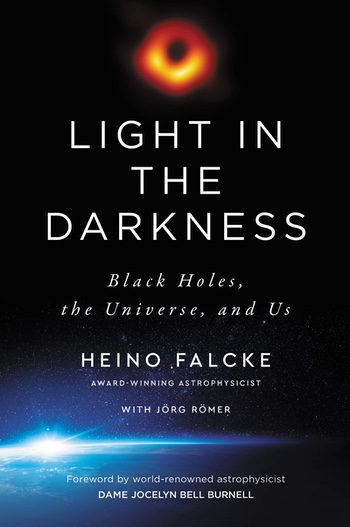Review: Light in the Darknessby Jeff Foust
|
| “Contrary to popular belief, black holes generally aren’t wildly voracious monsters: they’re very well behaved and eat only what they’re served,” he writes. |
The early chapters of the book provide an overview of astronomy broadly, and black holes more specifically; Falcke includes some personal anecdotes in what is a stage-setting discussion. The book hits its stride in part three (of four), when he recounts the development of the Event Horizon Telescope. He was involved in the project from its earliest days, working with other scientists to create a globe-straddling network of telescopes whose data could be combined to simulate a telescope as large as the Earth.
The first results of that effort made headlines in April 2019, when they released the first image of the black hole in the heart of M87, a supermassive black hole six billion times the mass of the Sun. Creating that image took years of work by a large group (a four-page appendix lists all the members of the Event Horizon Telescope team.) Most of that work is done remotely, with video collaboration that the pandemic made commonplace but which was still somewhat novel at the time (when key participants did meet in person in November 2018 in the Netherlands, he writes, some greeted each other with, “I know you from TV.”)
From the April 2019 announcement, we know the collaboration was successful, but it was not without its problems, from technical glitches to poor weather to, in the case of an observatory in Mexico, a group of astronomers held up by an armed gang. We don’t hear as much about any interpersonal conflicts among the team; they’re made out in the book to be a largely harmonious group with a shared passion for imaging a black hole.
Near the end of Light in the Darkness, Falcke becomes philosophical, using the studies of black holes as a jumping-off point for discussions reconciling science and religion and the “personhood of God.” It’s a bit of a departure from the astrophysics, and the quest for discoveries, that make up most of the book.
The Event Horizon Telescope’s work continues, despite technical issues, and the pandemic, that halted observations in the last few years. Astronomers continue to analyze the data of the black hole in M87 while holding out hope that it can also see the much closer, but significantly smaller, supermassive black hole in the center of the Milky Way. There’s still a lot to learn about black holes, including their dining habits.
Note: we are using a new commenting system, which may require you to create a new account.
